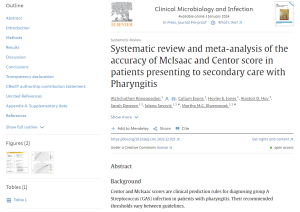Prediction scores ineffective for assessing group A streptococcus pharyngitis
25 January 2024
Centor and McIsaac clinical prediction scores are ineffective at assessing patients who need antibiotics when they come to hospital with a sore throat, according to a paper published in Clinical Microbiology and Infection.
Pharyngitis — also known as a sore throat — is an inflammation of the throat, caused by a viral or bacterial infection, which results in soreness, fever and discomfort during swallowing. Sore throats are common. Many adults and children are likely to develop one over the course of a year, but they usually get better by themselves without needing any additional treatment.
However, up to 30 per cent of pharyngitis cases are caused by group A streptococcus (GAS) bacteria. GAS pharyngitis can cause other serious complications to develop such as middle-ear infections, sinusitis or scarlet fever. The Centor and McIsaac scores were developed to predict how likely someone is to test positive for GAS if they have pharyngitis. They use a patient’s symptoms and clinical findings to help decide if antibiotics should be prescribed.
The study team reviewed 14 studies which reported using either the McIsaac or Centor scores to evaluate how likely patients were to develop GAS pharyngitis. They found little difference between using either score when it came to distinguishing which patients had GAS and which had non-GAS pharyngitis. Researchers established that, in both cases:
- at high clinical thresholds, too many true positive cases are missed
- at low clinical thresholds, too many false positives are treated
Missing positive cases means some patients may not be getting the help they need. Treating someone with a false positive result leads to patients being prescribed antibiotics they do not need, which promotes antibiotic resistance.
Findings from this study suggest that both scores have limited value in helping to diagnose GAS pharyngitis. However, to make sure that patients who may have been missed don’t become seriously unwell, the healthcare system must let them access help quickly (including antibiotics) if their symptoms get worse.
Atchchuthan Kanagasabai, lead author said:
“During our review we found that neither score was sufficiently sensitive or specific for diagnosing GAS pharyngitis. This means we cannot recommend the use of one score over the other to triage patients presenting to hospitals with pharyngitis.
“Providing access to additional care if symptoms become worse, educating patients about pharyngitis, and telling them when they should go back to their GP or emergency department may let us use prediction scores with higher clinical thresholds. This means more GAS pharyngitis patients may be excluded from receiving antibiotics.
“However, we hope that providing information and access to care if symptoms get worse would minimise potential harm to patients who miss out on receiving antibiotics. Overall, this approach could decrease the number of false positives treated with antibiotics and limit over-prescription.”
Paper
